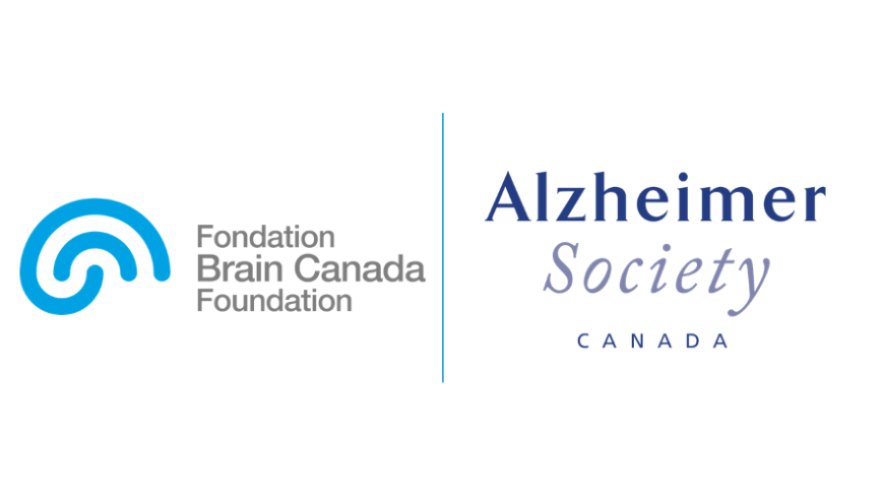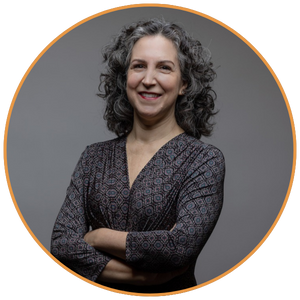Brain Canada and the Alzheimer Society of Canada announce $300K in awards to accelerate innovative ideas around dementia.

Toronto—Four exceptional Canadian researchers have been granted funding to share valuable knowledge about new research into Alzheimer’s disease and other dementias.
The one-year Knowledge Translation and Exchange (KTE) Accelerator Grants, which total about $300K, are co-funded by Brain Canada and the Alzheimer Society of Canada. This year’s grants focus on caregiver needs, knowledge barriers in diverse communities, end-of-life care, and food and nutrition.
“We are pleased to partner with the Alzheimer Society of Canada to ensure research has a meaningful impact on the lives of Canadians and reaches the people who need it most,” says Dr. Viviane Poupon, President and CEO of Brain Canada. “Developed in partnership with people with lived experience and other stakeholders, important new resources will lead to policy change, self-advocacy and health equity.”
Created to stimulate innovative, out-of-the-box ideas, the KTE Accelerator Grants ensure research translates into implementation and impact by engaging with health policymakers, administrators, service providers, community groups and the public.
“These grants are a game-changer for individuals across Canada living with dementia,” says Luca Pisterzi, Vice President, Research, Programs & Evidence at the Alzheimer Society of Canada. "They allow us to deliver essential information and support directly to those who need it most — and do so without delay."
The award recipients are:
Kristina Kokorelias of Sinai Health System:

Enhancing Support for Alzheimer's Caregivers: A Comprehensive Approach to Caregiver Needs and Healthcare Integration Across the Disease Trajectory.
Dr. Kokorelias will disseminate practical advice to healthcare administrators, providers and policymakers on a research model developed in 2022 that illustrates the progression of responsibilities and support needs over time for caregivers of people living with dementia. The goal is to increase understanding and ensure that the appropriate resources are provided at each phase of the disease.
Claire Godard-Sebillotte of The Research Institute of the McGill University Health Centre:

The Social Network: Moving evidence on dementia into practice with ethnically diverse communities.
Research evidence indicates that people from equity-seeking groups, particularly those from racialized communities, face significant barriers along their dementia journey. Dr. Godard-Sebillotte’s project will raise awareness of dementia and promote self-advocacy by using social networks in Ontario and Quebec to address cultural and linguistic needs and provide policy recommendations to address barriers to diagnostic and support services.
Pia Kontos of KITE Research Institute - University Health Network and Sherry Dupuis of the University of Waterloo:


Relational end-of-life care for people living with dementia: Innovating education and supporting practice change.
People living with dementia at the end of their lives have challenges that are exacerbated by stigma, assumptions about individual capabilities, an unpredictable disease trajectory, complex physical and psychological needs, communication difficulties, and changes in preferences over time. Dr. Kontos’s and Dr. Dupuis’s project will challenge the stigma, raise awareness about the importance of end-of-life conversations and wishes, and disseminate knowledge about the support needed for compassionate care.
Heather Keller of Schlegel-University of Waterloo Research Institute for Aging:

Cooking Together: promotions and resource development.
Cooking Together is an intergenerational program for people living with memory loss or dementia that is designed to build and retain food skills, support a sense of connection, provide an opportunity for healthy eating, and decrease stigma – specifically in youth, people with dementia and their care partners. Dr. Keller’s project will co-develop a promotional video for potential participants and providers, offer one-off sessions to promote the program, create demonstration videos of recipes used in the program, and assemble a manual for potential providers.
Brain Canada’s support is provided through the Canada Brain Research Fund, an innovative agreement between the Government of Canada, Health Canada, and the Brain Canada Foundation to increase investment in brain research on behalf of Canadians and maximize the impact and efficiency of those investments.
The Alzheimer's Society (ASC) is Canada’s foremost national health charity for people living with Alzheimer’s disease and other dementias. The Alzheimer Society Research Program is Canada’s leading funder of research into better understanding the causes of disease, improving treatment and care, and finding a cure.
